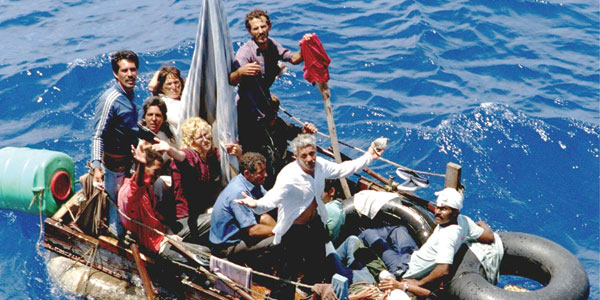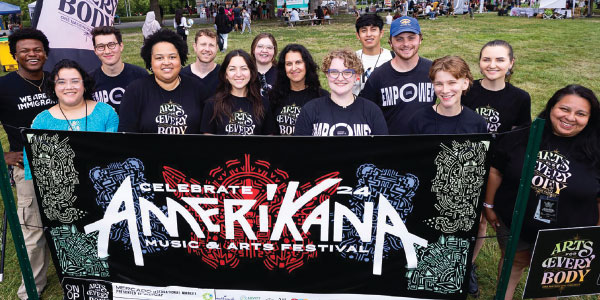A los que estamos fuera se nos olvida, pero Cuba es una dictadura. Eso es algo imposible de olvidar para los 11 millones de cubanos que están dentro de la isla. Lo sufren todos los días.
El deshielo de poco más de un año entre los gobiernos de Washington y de la Habana ha cambiado la conversación. En lugar de hablar de la falta de libertades, de las enormes carencias económicas y de violaciones a los derechos humanos, las noticias reportan la reapertura de embajadas, más turismo e, incluso, hasta el posible fin del embargo. Los más atrevidos imaginan, también, el regreso de Guantánamo a manos cubanas.
Pero en el fondo, Cuba sigue siendo una dictadura. El dictador Fidel Castro le heredó el puesto a su hermano Raúl, y ahí sólo sus chicharrones truenan. No hay elecciones multipartidistas, no hay prensa libre, existen decenas de presos políticos y el régimen se sostiene a base de miedo.
No lo digo yo; lo dicen los pies de miles de cubanos que están huyendo. El día de Navidad aparecieron a las cuatro de la mañana 15 balseros, aún mojados, en el estacionamiento de una farmacia en uno de los cayos de la Florida, según informó El Nuevo Herald.
En Costa Rica hay alrededor de 8 mil refugiados cubanos varados. ¿Por qué? “Porque Nicaragua cerró la frontera e impidió un tránsito que se venía realizando con normalidad, aunque en manos de coyotes”, me dijo en una entrevista el presidente costarricense, Luis Guillermo Solís (aquí está la entrevista por televisión: bit.ly/1JYdJw6).
Traducción: Los cubanos están huyendo como sea de su país. Miles lo hicieron recientemente a través de Ecuador y luego, por carretera, cruzando Centroamérica y México hasta llegar a la frontera con Estados Unidos.
En el año fiscal 2015 llegaron más de 40 mil cubanos a Estados Unidos, cifra récord de acuerdo con la Agencia de Aduanas y Protección Fronteriza. La culpa de este éxodo, dicen los cínicos de La Habana, es la política de “pies secos, pies mojados”— o la ley de Ajuste Cubano — que permite que un refugiado cubano se convierta en residente de Estados Unidos un año después de tocar territorio norteamericano. Pero se equivocan. La verdadera culpa es de la dictadura que los obliga a huir.
Hay mexicanos y centroamericanos que se quejan constantemente de que Estados Unidos trata a los refugiados cubanos de una manera privilegiada. Después de todo, si un inmigrante indocumentado de México o Centroamérica toca territorio estadounidense es detenido y deportado. A un cubano no le pasa lo mismo.
Pero, yo creo que hay que seguir protegiendo a los refugiados que vienen de la isla hasta que desaparezca la dictadura cubana. Siempre hay que proteger a las víctimas de las dictaduras. La mitad de los cubanoamericanos cree lo mismo, según una encuesta de Bendixen y Amandi. (Un 34 por ciento se opone.) No se trata de quitarles a los cubanos las protecciones migratorias especiales. De lo que se trata es de darles protecciones similares a los que vienen de otros lugares.
Una dictadura es una dictadura. Entiendo a los cubanos que nunca le darían la mano a los Castro y que rechazan el nuevo acercamiento diplomático de Washington. Yo tampoco le quisiera dar la mano a alguien que me quitó la casa y el trabajo, que mató o encarceló a un familiar y que me obligó a huir de mi país. Pero sospecho que, detrás de este acercamiento diplomático, hay un objetivo secreto.
El presidente Barack Obama no es ingenuo. Desde luego que no puede decir que el objetivo de su política de apertura y de mayores contactos es cambiar el régimen de los Castro. Si lo hubiera dicho, no habría acuerdo. Pero cuando la historia cambie en Cuba y regresen los vientos democráticos, estoy seguro que se darán a conocer los detalles de las reuniones a puerta cerrada en que se tramó un nuevo destino para la isla.
Sólo los cubanos pueden cambiar a Cuba. Nadie más. Pero ahora deben saber, como nunca antes, que no están solos. Como agua que se cuela por las rendijas, la internet está penetrando los lugares más recónditos de la isla. Es carísima para el cubano común. Cierto. Y aun así se han enterado cómo cambiaron Argentina y Guatemala, cómo está cambiando Venezuela y cómo ellos son los siguientes en la lista. No hay nada que pueda detener una idea cuando su tiempo ha llegado.
No podemos olvidar que Cuba es una dictadura. Y ante las dictaduras no se puede ser neutral. De ellas se huye o se pelea desde dentro, con uñas y “clics,” hasta que caen.
Cuba Is Still a Dictatorship
Sometimes those of us who live outside Cuba forget that the country remains a dictatorship. But for the 11 million people living on the island, forgetting is impossible — they live the consequences every day.
But the thaw between Washington and Havana that began last year has dramatically shifted the conversation in the U.S. For instance, when covering Cuba these days, the media no longer focuses on the lack of freedoms, economic shortages or human-rights violations. Rather, the news is dominated by the reopening of the American embassy, the growing number of tourists visiting Cuba and a potential end to the decadeslong U.S.-imposed embargo. Some daring commentators even envision that the American-controlled facilities at Guantanamo might one day soon be handed back to the Cubans.
However, the Castro dictatorship still holds power. Almost 10 years ago, after decades in charge, Fidel Castro hand-picked his brother Raul to succeed him (Fidel will be 90 in August; Raul is 84). The Castros reign over a country where there are no pluralistic elections or a free press, and where dozens of political prisoners remain locked up for speaking out against the government. Essentially, the regime still rules with fear.
But don’t just take my word for it. Ask any of the thousands of Cubans who continue to flee the island any way they can.
Many are traveling to Ecuador, then trying to cross Central America by land in order to make it to the U.S., which has led to regional immigration troubles. Some 8,000 Cubans are currently stranded in Costa Rica, unable to get transit visas to Nicaragua because Nicaragua has “closed its border and stopped the traffic that was going on normally, albeit run by traffickers, for many years” Luis Guillermo Solis, the president of Costa Rica, told me in a recent interview.
Other Cuban migrants risk a perilous ocean journey on small boats in order to reach Florida. On Christmas morning last month, about 15 Cuban migrants showed up in the parking lot of a drugstore in the Florida Keys, still soaking wet from their journey.
The ultimate goal of many Cuban migrants is to reach the U.S. no matter what because policies here generally allow them to stay and become residents after a year. According to government figures, more than 40,000 Cubans came to the U.S. last year. Cynical critics will say that the reason for this influx of migrants is fear that thawing relations between the U.S. and Cuba will mean that Cuban immigrants won’t receive special status much longer. But the cynics are wrong. The real fault lies with the Castro dictatorship that forces them to flee.
That the U.S. accords Cubans a privileged status haslong been a sore spot for many Mexicans and Central Americans. Undocumented immigrants from those countries are in constant danger of being detained and deported. Cubans don’t face such a threat. However, I do think that we should continue to protect Cuban refugees who arrive in the U.S. — at least until the Castro dictatorship disappears. We should always protect victims from any dictatorship.
As for the Cuban-Americans who vehemently oppose the Obama administration’s current initiatives with the Castro regime, I understand their apprehension. I wouldn’t want to shake hands with someone who took away my house or my job, who killed or imprisoned a family member, or forced me to flee my country. But I suspect that behind this diplomatic rapprochement lies a hidden goal.
President Obama is not naïve — he can’t come out and say that the purpose of his policies toward Cuba is to remove the Castros. But Cuba will change, and once the democratic winds begin to circulate there again, I’m sure that we will know many more details about the closed-door meetings in Washington where the country’s fate was discussed.
In the end, only Cubans can change Cuba. But they should realize that they’re not alone. The Internet is on its way to reaching every corner of the island, despite government restrictions and a price that remains prohibitively high for the average Cuban. But Cubans know that change is happening elsewhere — notably in Guatemala, Argentina and Venezuela. And Cuba is next on the list.
Nothing can stop an idea whose time has come.











